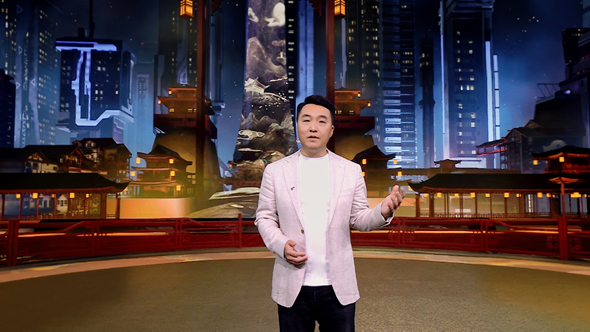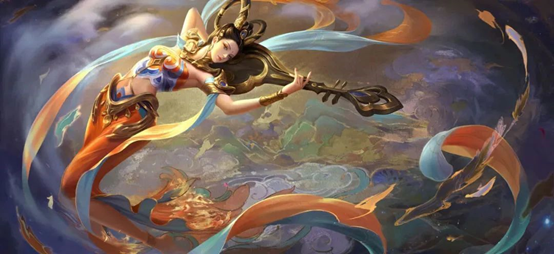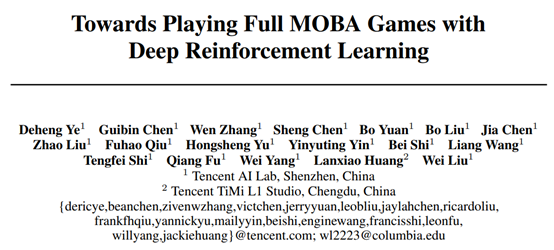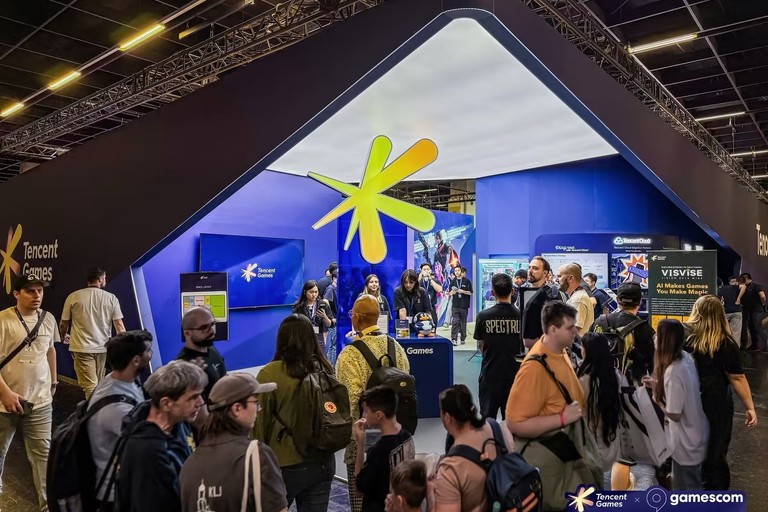The Infinite Possibilities of Video Games
Technology has spurred a global transformation in entertainment and living, which brings new scenarios and possibilities to video games.
Recently, Steven Ma, Senior Vice President of Tencent, shared his vision for the future of video games. Ma’s first experience playing video games was in the early 1980s. Nearly 40 years later, as a first-hand witness to the industry’s development, he believes games today are not only an entertainment phenomenon, but also a driving force for the advancement of cutting-edge technologies, such as artificial intelligence, as well as connecting people around the world. Ma believes that technological innovation in games today will help shape the world we experience tomorrow.
 Steven Ma, Senior Vice President of Tencent, shared his vision for the future of video games at the Tencent Games Annual Conference 2021 held online.
Steven Ma, Senior Vice President of Tencent, shared his vision for the future of video games at the Tencent Games Annual Conference 2021 held online.
Q: What do video games mean to you?
A: I think games have always existed in different forms throughout human history, and these activities have helped shape society. Right now, video games have a more important role because they are driven by technology, which has expanded their potentials. It’s a way of creativity, a platform for social interaction and a connection between virtual and reality. We can’t consider the games of today in a narrow sense. Instead, today’s video games could be considered a “Hyper Digital Reality” driven forward by technologies. Games in the future will go far beyond our current imagination and will bring more possibilities to our lives.
Games also help to drive technological progress, providing a way for technology to enter people’s lives, opening a wide space to allow technology to spread into all aspects of life. For example, in the first Industrial Revolution, the increased demand for clothes pushed technological upgrades in the textile industry and gradually kicked off the Industrial Revolution. Today, the games industry plays a similar role in the information industry. Games act as an important driving force for the progress of emerging technologies such as AI. NVIDIA was initially started to power high end 3D graphics for games, but it is now one of the most important drivers of AI progress.
Many explorations we make in games today will contribute to shaping the future.
Q: Are there limits to what is possible in video games?
A: With the rapid development of technology, I think video games will have more possibilities and their boundaries will expand even further. It not only brings innovation of entertainment, but also stimulate imagination. During last year’s pandemic, more than 12 million people attended an online concert together in a video game. Esports, as an emerging industry derived from video games, has created millions of values. Scenarios which were not even imagined in games in the past now happen every day. I think even more imaginative applications and scenes will be possible in the future.
Although the video games industry is developing very fast and expanding at great scale, we are still in the early days. With the introduction of electricity in the second Industrial Revolution, the film and television industry gradually emerged. If we adjust this time scale into the 1980s, when video games were born, the games industry is more comparable to 1930s-era Hollywood. There is still a significant gap for us to close in this arena.
The development speed, scale, range, and depth of information technology is much greater than the last Industrial Revolution. This brings unimaginable opportunities for games and the space is almost limitless.
Q: Recently, Tencent Games proposed a concept called the “Hyper Digital Reality”. Would you please explain what it means?
A: “Hyper Digital Reality” is our understanding of the nature of the game.
First of all, video games are driven by technology. For example, without the development of the internet, there would be no online games today. Without 3D technology, there would be no FPS (First Person Shooting), TPS (Third Person Shooting) and other game genres that we have today. The computer revolution is still going on, and there will be more technological developments, shaping the future of video games.
Secondly, we need to expand the meaning of video games. You used to use a mouse, keyboard, or gamepad to play a game, now you have VR and AR, and in the future, there will be more operational modes to play a game. Games can also be expanded to more applications. Everyone should be open and dynamic to the possibilities. We hope to break the cognitive inertias and limitations through the “Hyper Digital Reality” and explore the future possibilities with the industry.
Thirdly, video games provide a broader way to connect people with society, which could create value in real life. A lot of content in video games has become reality. Esports is the best example, which is a digital sports scene in the real world derived from video games. It could be observed that the interaction between video game and reality is becoming more frequent, which is one the most important features of the “Hyper Digital Reality”.
We expect this digital reality would connect the virtual world with reality, connect people with people, connect people with ideas and interests, while driving the technology advancement and creating more possibilities. I think this is also the mission of Tencent Games. We hope our efforts will deliver more fun to more players.
 Steven Ma believes that games are becoming the “Hyper Digital Reality” that enable infinite possibilities.
Steven Ma believes that games are becoming the “Hyper Digital Reality” that enable infinite possibilities.
Q: In this “Hyper Digital Reality”, there should be a lot of content. What kinds of content will it be, and how will Tencent blend that together?
A: Video games give people more room to imagine. We have scenarios about science, the future, and extraordinary lives in games. We can also simulate the real world in games, such as the cooperation that Honor of Kings had with the Dunhuang and Yue Opera, which incorporated Chinese traditional culture into our games.
We designed an Apsaras (a cloud and water spirit from Hindu and Buddhist culture) skin in Honor of Kings, based on a mural located in Dunhuang, China. While roughly 2 million people visit Dunhuang each year, there are almost 40 million players using the Apsaras skin.
The audience pool for Chinese traditional Yue Opera is shrinking, perhaps just tens of thousands of people watch live Yue Operas each year. We found a master of the Yue Opera to help us design a skin known as “Butterfly Lovers” in Honor of Kings, which means the character design, voice, and movements are all connected with the Yue Opera. About 80 million players have used that skin.
 Apsaras skin cooperated by Honor of Kings and Dunhuang
Apsaras skin cooperated by Honor of Kings and Dunhuang
Games allow players to perform many different roles in the virtual world. For example, we developed Seeing, a game simulating visual-impairment. It allows people to experience scenarios that they never would have been exposed to in their real life.
It’s the introduction of those scenarios and different characters that makes us realize how malleable games are and how scalable they are. In the future, as technology grows stronger, it will deliver even better simulation, greater openness and lower the threshold for game creation. I believe we will see more and more combinations of games incorporating traditional literature, operas, and the arts.
Q: There is a lot of discussion about AI and games, how do you see the relationship developing?
A: For deep learning AI, a simulated world with rules is a better place to work. We applied AI technology to Honor of Kings and while watching the AI playing the game, we found that it quickly reached the level of human esports players.
AI can also be used for simulating human behaviors in games, and these behaviors are becoming more realistic. AI can even rival human players, making our games more competitive and collaborative. We have also tried using AI technologies from games to build simulation environments for automakers to improve the efficiency and safety of autonomous driving tests. If AI can learn to perceive, analyze, and decide to act in real time in a complex game environment, it can also play a greater role in a variable and complex real-world environment.
AI can also help us develop games. If a game is to be realistic and big enough, it must include a wealth of rich content. Some content development and world construction for games can also be done by AI.

Wukong AI has been included in the top AI conference NeurlPS 2020 and the top journal TNNLS.
Q: What’s the vision for Tencent Games and how is the company working towards achieving it?
A: In 2019, we proposed our brand vision - “Spark More”. With the further development of technology, we hope games will unleash their ability as a “Hyper Digital Reality” to connect tightly to the real world, and to boost the interest and possibility for more people.
We have to mention how games help spark creativity in youngsters here. We have a cooperative project called LuoBuLeSi, a game specifically geared for teenagers that provides players with both the game and the tools to create the game.
It is easy to use, even children can use it. The most successful game developed on it has generated several million U.S. dollars in a single year. The development team is made up of a group of teenagers, who operate it like a company. I think it delivers better education experience than any business school. Video games like this provide skills to more people, allowing them to make something real with games in ways you could not imagine in the past. And this skillset can really help these youngsters in real life.
The world now is highly professional. People dive very deep into subjects that interest them, which requires lifelong study. Video games can help teenagers build long-term ambitions through fun and exploration. As technologies develop, more and more people will transition into digital scenarios. How to better guide teenagers and create better conditions for them are important issues to discuss.
Q: Tencent has been deeply involved in games for many years. As a developer and publisher in the game industry, what expectations do you have for Tencent Games in the future?
A: Tencent Games is now one of the leading games platforms in the world. Therefore, I think we have the following responsibilities to take on.
Firstly, I hope we can help the industry explore even more possibilities and advance its development.
Secondly, we want to combine new technologies and more profound art forms with games, to make better experiences for players. This is what we want to achieve the most as a video game developer.
Thirdly, video games are still a very new concept. With more and more people playing, we need to engage society as a whole. We have to figure out how video games and people can work in harmony and unison.
Finally, because video games have infinite possibilities, they should take on more social responsibilities. For example, video games and technologies could be used for education to help deliver better results. I think this is what we should do as an industry-leading company.
Q: What do you expect others to think of the games industry and Tencent Games in 20 years?
A: People will recognize that video game is an industry driven by technology. Twenty years from now, I believe virtual reality (VR), augmented reality (AR) and artificial intelligence (AI) technologies will be applied in games across the board and change the experience greatly.
I look forward to more and better games in the future, as the best way to define a video game company is by the games that are valued by their players.





